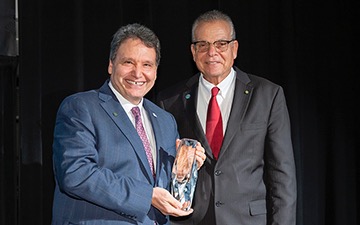As history witnesses the rise and fall of many empires, the United States of America continues to hold its position as a prominent global superpower, but how did it get there and how long will it last?
Dr. Chau Kelly is an associate professor of History at the University of North Florida with a specialization in the history of imperialism. Imperialism is defined as a policy of extending a country’s power and influence through diplomacy or military force.
When speaking about the factors that have helped America rise to its super power level in the world, Dr. Kelly explained that we have had some powerful allies over the years that urged us to get involved in imperialism. One of whom was Great Britain.
“If you go back to the Rudyard Kipling poem, The White Man’s Burden, that’s a reference urging the United States to get involved in terms of imperial activities around the world. The U.S is often referred to as an imperialist nation by invitation,” said Kelly.
Toward the late 19th century, the U.S started reaching out beyond its borders. According to Dr. Kelly, we have also had our own internal imperialism through the spread of settlers from the original 13 colonies. Once Americans achieved independence, they began to spread across the region known as the United States. For example, California didn’t formally join the United States until 1850 with the discovery of gold.
“There has been this constant spread of the U.S in terms of our territorial growth as a country, but also internationally. Hawaii and Alaska for instance were part of an international spread. The idea that the U.S has been an isolationist nation is sort of a historical illusion and ignores the reality in terms of what we have actually been involved in. We were late to join the world wars, but that doesn’t mean we were not involved in other imperial interests. Trade is often the first step, but the military is also a key player,” explained Dr. Kelly.
The United States is a diverse country founded and cultivated by immigrants and those who share different backgrounds and perspectives. According to Dr. Kelly, Most immigrants that come to the United States come for a variety of reasons. The most common reason being that the United States is a land of opportunity. It’s a land of freedom where you can agree or disagree with the government without facing persecution. Being able to have things like freedom to practice religion defended in the Constitution is very exciting and people want that.
“Political views are often shaped from experiences. We have always been a pluralist society. It’s a negotiation process. The problem is we don’t talk to people who disagree with us much anymore,” said Dr. Kelly.
A lot of people like to compare the United States empire with the Roman empire of the past, but Dr. Kelly doesn’t really see it that way.
She said that the reality is that the Roman empire is a land-based empire. Its expanse was based on ideas behind being a war machine and conquering all imperial boundaries. The U.S is ideological and relies heavily on what we would call soft power. Soft power is our ability to influence political and social activity around the world. We see the U.S. do this through the United Nations, foreign aid, and the world bank. The U.S. also has military bases all around the world.
“When we think of Rome and its fall, we are thinking about the collapse of a civilization. If we want to look at the rise and fall of empires and how they change in comparison to the U.S, it may be better to look at Great Britain. They lost a lot of their empire due to decolonization. In the U.S., we have decolonized in some spots, but in others we have not,” said Dr. Kelly.
Could extreme disunity lead to eventual downfalls of empires? Dr Kelly said:
“It depends on the type of disunity. The United States is a big country which is a significant challenge for it. Geographically we are incredibly expansive.”
Culturally, regions are different even though there are similarities. Dr. Kelly believes that the fragmentation of the country is based largely on the differences between the states. Because we are in a federalist system, state governments get to set laws for the internal workings of each state. This influences how people across the nation understand crises differently. The ideals and principles of the Constitution of the United States is the connective tissue that ultimately binds us.
Dr. Kelly explained that civilizational decline is often gradual, but it can be sudden like with the dismantling of the Ottoman empire. She said:
“It is generally slow. Most people don’t know it’s happening. You can sometimes notice it if you are paying attention. Civilizational collapse is really not usually crises laden like it’s presented to be. Something new does emerge. It might be smaller or less powerful. It becomes different. It’s a readjustment.”
__
For more information or news tips, or if you see an error in this story or have any compliments or concerns, contact editor@unfspinnaker.com.












